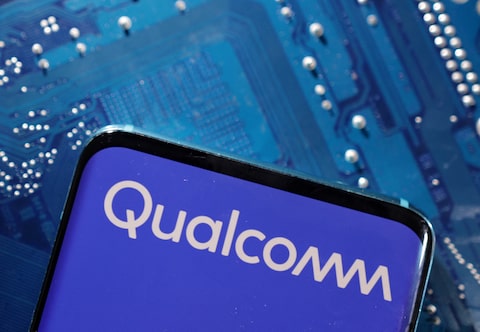Summary
- AI boosts Microsoft and Alphabet earnings amid trade war
- Consumer electronics face tariff-strains, impacting Apple and Amazon
- Samsung and Qualcomm warn of growing demand uncertainties
- Microsoft’s AI-driven Azure growth boosts investor confidence
May 1 (Reuters) – The fortunes of Big Tech are diverging in a rapidly changing business landscape, as demand for artificial intelligence fuels growth in cloud and digital ads while consumer electronics take a battering from President Donald Trump’s global trade war.
AI came to the rescue of earnings at Microsoft and Google-parent Alphabet (GOOGL.O) in their March quarter, offering investors hope that their billion-dollar bets on the technology would help them ride out the fallout from sweeping U.S. tariffs.
Their upbeat commentary stood in stark contrast to gloomy predictions from companies more exposed to tightening consumer budgets: chipmakers Qualcomm, Samsung Electronics and Intel (INTC.O), warned that economic uncertainty caused by Trump’s attempts to reorder global trade was hurting their businesses.
The split highlights how enterprise-focused firms are holding steady despite economic jitters, while a pullback in consumer spending is weighing on demand for smartphones, personal computers, and the chips that power them.
This could spell trouble for Apple (AAPL.O), which makes 90% of its products in China and generates about half its revenue from iPhone sales. Amazon.com’s e-commerce business could be hit as well, though its cloud division – which accounts for most of its profit, is expected to hold up like Microsoft and Google’s.
Amazon and Apple are scheduled to report results on Thursday after mthe arket closes.
“There hasn’t been an impact on their (Google and Microsoft’s) businesses yet because they’re not in the consumer business. As we get into Apple and Amazon, that may be a little different,” said D.A. Davidson analyst Gil Luria.
“Apple is going to be impacted, there’s very little that they can do to avoid some impact due to tariffs. With Amazon, the disruption is a little more pronounced on the retail side because many of their merchants are in China.”
The Trump administration has so far spared electronics from tariffs, but Washington has signaled that some levies could be imposed in the coming weeks.
Apple will try to mitigate tariffs by shifting production of U.S.-bound iPhones to India, Reuters has reported, but it is likely to keep price increases to a minimum to avoid losing market share and would have to stomach any elevated costs.
Some third-party merchants on Amazon, who sell China-made goods during the company’s buzzy July shopping event, are planning to sit it out this year to protect profit margins, Reuters has reported.
AI SPENDING PAYS OFF
Samsung, which makes smartphones as well as chips that go in them, struck a more cautious tone, saying “demand uncertainties are growing in the second half as a result of recent changes in tariff policies in major countries.”
Mobile chip designer Qualcomm on Wednesday forecast third-quarter revenue that would miss estimates, reflecting the impact from tariffs. Apple is known to be Qualcomm’s biggest customer.
Microsoft on Wednesday reported a stronger-than-expected 33% jump in revenue in its Azure cloud business and forecast an acceleration in growth. Alphabet last week posted an 8.5% rise in its mainstay ad sales, as the integration of AI into Google search increased its appeal to advertisers.
Facebook-parent Meta (META.O), on Wednesday, also topped revenue expectations on strong ad sales. But Meta’s smaller rival Snap (SNAP.N), said on Tuesday it would not issue a quarterly forecast due to economic uncertainty, as advertisers favor bigger platforms in tough times.
Microsoft stock surged 7% after hours on Wednesday, while those of AI chip suppliers Nvidia (NVDA.O), Advanced Micro Devices, and Broadcom each gained more than 3%.
“Through April, demand signals across our commercial businesses as well as in LinkedIn, gaming and search have remained consistent,” Microsoft CFO Amy Hood told analysts.
Some analysts said the strong results from Microsoft suggested that fears the tech giants may have added too much data center capacity to support AI demand may have been overblown.
The Windows maker, whose shares have declined 6% this year, had been under pressure after analysts’ reports said it canceled some data center leases in a potential sign of oversupply.
But on Wednesday, the company said that AI’s contribution to Azure growth increased to 16 percentage points in the March quarter, from 13 percentage points in the previous three months.
“The big improvement in AI contribution shows the high potential for AI once capacity becomes available,” Barclays analysts said in a note.
Microsoft, which plans to spend $80 billion on AI infrastructure this fiscal year, warned it remains supply-constrained, mirroring comments from Alphabet.
“We had hoped to be in balance (cloud capacity) by the end of the fourth quarter. We did see some increased demand, as you saw through the quarter, so we are going to be a little short, a little tight as we exit the year, but are encouraged by that,” Microsoft’s Hood said.
Reporting by Aditya Soni and Deborah Sophia in Bengaluru; Editing by Sayantani Ghosh and Shri Navaratnam





